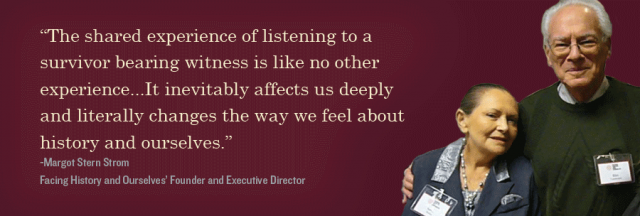Survivor testimonies—firsthand accounts from individuals who lived through genocide and other atrocities—help students more deeply appreciate and empathize with the human and inhuman dimensions of important moments in history. They supplement what we learn from historians and secondary sources by offering unique perspectives on the difficult and sometimes impossible situations individuals were forced to confront during moments of collective violence and injustice.
At 3 p.m. EST on December 8, Facing History and Ourselves hosts Using Survivor Testimony in the Classroom, a free one-hour webinar that will introduce tools and resources to help you bring survivor voices into your classroom and scaffold for visits. Register today.
Ahead of the webinar, we sat down with webinar facilitator and Facing History Senior Program Associate for Technology K.C. Kourtz to talk about how using survivor testimony in the classroom can engage students and help them connect history to their own lives today.
Facing History: What resource or teaching strategy would you recommend to a teacher interested in using survivor testimony in the classroom?
K.C. Kourtz: This video "Passing the Torch" really gets to the heart of why preserving recorded (video, audio, written, multimedia) survivor testimony is so essential. It also underscores the importance of second- and third-generation testimony. For classroom resources, I love Simon Wiesenthal’s The Sunflower, and this accompanying lesson idea that a teacher once shared with Facing History. It complicates students’ perceptions of what it means to judge, and to forgive.
How can survivor testimony help further a student’s understanding of history?
Survivor testimony deepens a student’s understanding of history by personalizing and humanizing it. By either meeting a survivor face-to-face or listening to/watching recorded testimony, students bear witness to the human experience of survival and learn to empathize with the human and inhuman dimensions of important moments in history.
How can Facing History help connect interested educators with a survivor who can speak in their classroom?
For educators in our Educator Network, we have a speaker request form that anyone interested in having a speaker visit their classroom complete.
Have you ever had an experience with a survivor that shaped how you understand a specific moment in history?
I had the unique opportunity to visit Yad Vashem with my Facing History colleagues a few years ago and met several survivors, one of whom had an amazing sense of humor. I could not get over how someone who had encountered the absolute worst of humanity could laugh so freely. I asked him this very question and he replied, “Otherwise, hate wins.” I think of him and remind myself of this life philosophy every day.
Register today for Using Survivor Testimony in the Classroom – Spots Still Left!


